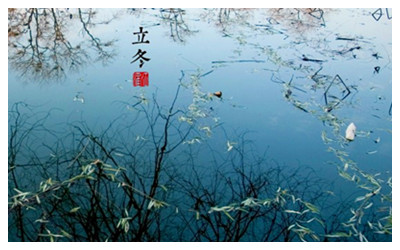Skype: neodalle-travel
Tel: +86 135 7447 2266
E-mail: sales@visitaroundchina.com

 Start of Winter, (Chinese: 立冬 lÌdöng), the 19th solar term of the year, begins this year on Nov 7 and ends on Nov 21. Start of Winter is the first solar term of winter, which means winter is coming and crops harvested in autumn should be stored up. Here are some things you should know about Start of Winter.
Start of Winter, (Chinese: 立冬 lÌdöng), the 19th solar term of the year, begins this year on Nov 7 and ends on Nov 21. Start of Winter is the first solar term of winter, which means winter is coming and crops harvested in autumn should be stored up. Here are some things you should know about Start of Winter.Beginning of winter or not
In ancient times, the Chinese people took the Start of Winter to be the beginning of the winter. In fact, the Start of Winter is not the beginning of winter in terms of meteorology. The climate every year is different, so the beginning of winter could be quite different. And with the vast territory of China, winter in every area doesn't begin at the same time.
Welcoming the winter in ancient times
The four beginnings of the seasons were important festivals in ancient times. Before the Start of Winter, an ancient emperor would take a shower and eat no more meat. On that day, the emperor would lead his officials to the suburbs and perform the ceremony of "welcoming the winter."
Eating dumplings
A legend has it that at the end of the Eastern Han Dynasty (AD25-220), "Medical Saint" Zhang Zhongjing saved many people in Henan province from a typhoid epidemic and their ears from being frostbitten around Start of Winter.
He cooked mutton, hot peppers and herbs to dispel the cold and increase body heat. He wrapped these ingredients into a dough skin and made them into an ear shape. Since then, people have learned to make the food, which became known as a "dumpling". Today there is still a saying that goes "Eat dumplings on Start of Winter Day or your ears will be frostbitten".
"Nourishing the winter"
On the first day of Start of Winter, there is a custom, "nourishing the winter", in Southeast China, in places such as Fujian, Guangdong and Taiwan provinces. To prepare for the coming of a cold winter, people there like to eat high-calorie foods, such as chicken, duck, beef, mutton, and fish, which are usually stewed with the four traditional Chinese medicines: angelica, ligusticum wallichii, Chinese herbaceous peony and rehmannia glutinosa libosch, to enhance the effectiveness of the nourishment.
Eating Chinese pumpkins
In Tianjin, on the first day of Start of Winter, people eat dumplings stuffed with Chinese pumpkins (wogua). It is a common vegetable in North China. Generally, the pumpkins are bought in the summer and stored until the Start of Winter when they are taken out.
 Ask Questions ?
Ask Questions ?